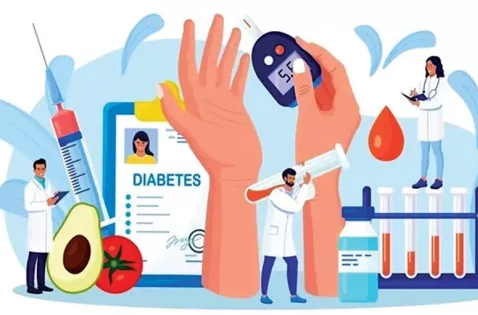Unveiling the Complexity of Diabetes Mellitus: Types, Symptoms, and Management
Diabetes mellitus is a condition characterized by consistently elevated blood sugar levels, and it manifests in different forms, with type 1 and type 2 being the most common.
Types of Diabetes:

Diabetes is closely linked to the body's ability to regulate glucose, a crucial source of energy.
Type 1 diabetes, an autoimmune disease, occurs when the immune system mistakenly targets and damages the insulin-producing cells in the pancreas.
However, type 2 diabetes develops when the body's cells become less sensitive to insulin, resulting in higher levels of blood sugar.
In pregnant women, gestational diabetes can occur, which can potentially increase the risk of developing type 2 diabetes in the future.
Signs and Complications:

Diabetes might not show any symptoms at first, underscoring the importance of regular blood tests. When symptoms become noticeable, they may include increased urination, thirst, and sudden weight loss.
There are various complications that can arise from diabetes, such as diabetic ketoacidosis and hyperosmolar syndrome, which require prompt medical attention.
Living with diabetes for an extended period of time can lead to a range of complications. These include issues like atherosclerosis, which can disrupt blood flow; retinopathy, which can impact vision; neuropathy, which can cause nerve damage and foot problems; and nephropathy, which can affect kidney function.
Diagnosis and Estimated Duration
Blood tests are crucial for diagnosing diabetes. There are several tests available to determine blood sugar levels, including fasting plasma glucose, oral glucose tolerance, random blood glucose, and hemoglobin A1c tests. These tests provide valuable information and help identify if someone has diabetes based on specific thresholds.
Type 1 diabetes is a condition that lasts a lifetime, whereas type 2 diabetes can potentially be reversed through lifestyle changes.
After giving birth, gestational diabetes usually goes away. However, it does raise the chances of developing type 2 diabetes in the future.
Treatment Approaches

For type 1 diabetes, insulin injections are necessary. On the other hand, type 2 diabetes usually starts with making lifestyle changes such as losing weight, following a balanced diet, and engaging in regular exercise.
Various medications, including pills and injections, may also be prescribed. Weight loss surgery may be considered a potential solution for individuals who have type 2 diabetes.
Consistent monitoring is essential for individuals managing diabetes. Keeping a close eye on blood sugar levels, taking immediate action for any deviations, and seeking medical help for symptoms such as vomiting or diarrhea are crucial aspects of taking care of oneself.
Comprehending diabetes requires delving into its intricacies, identifying symptoms, and embracing preventive and treatment measures. Managing type 1 or type 2 diabetes requires a proactive approach to lifestyle, regular medical check-ups, and adherence to prescribed treatments. These factors are crucial for maintaining a healthy and fulfilling life.
If you want to be proactive and keep your feet pain-free, DiabeticShoe.in is your one-stop shop for all things related to foot health.
Browse our Prescribed Orthotics to learn more.








